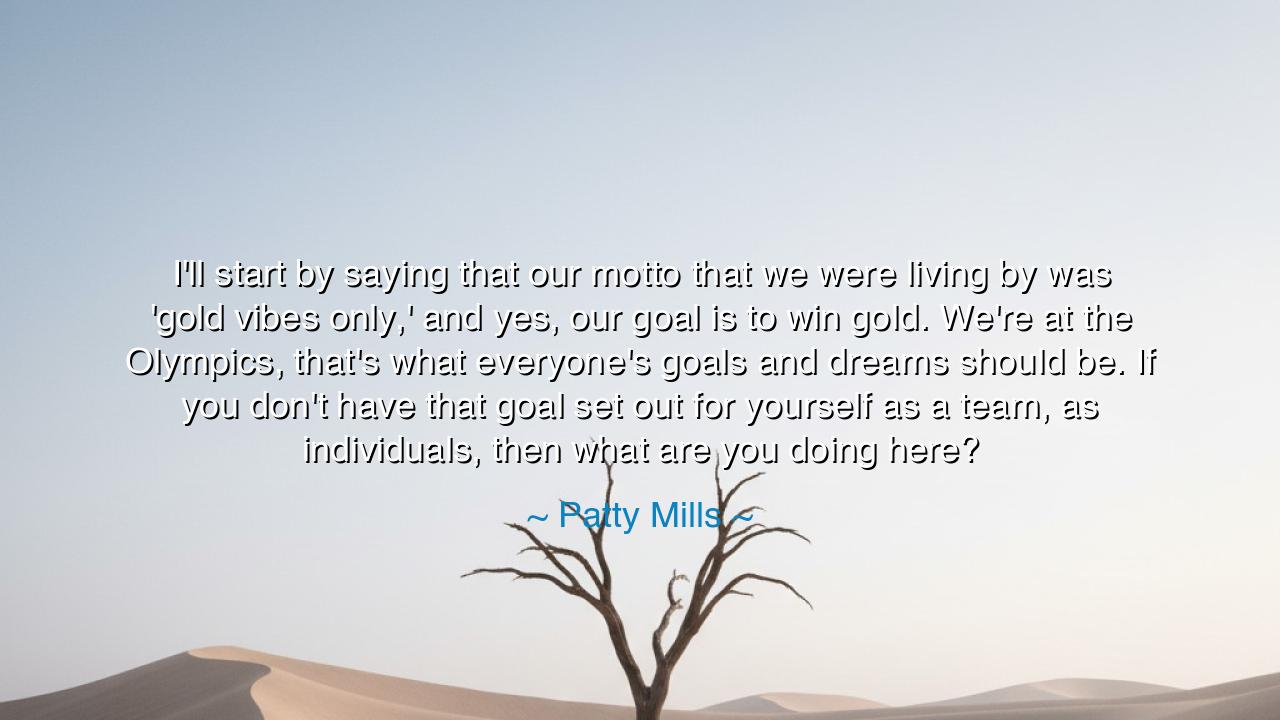
I'll start by saying that our motto that we were living by was
I'll start by saying that our motto that we were living by was 'gold vibes only,' and yes, our goal is to win gold. We're at the Olympics, that's what everyone's goals and dreams should be. If you don't have that goal set out for yourself as a team, as individuals, then what are you doing here?






The words “I’ll start by saying that our motto that we were living by was ‘gold vibes only,’ and yes, our goal is to win gold. We’re at the Olympics, that’s what everyone’s goals and dreams should be. If you don’t have that goal set out for yourself as a team, as individuals, then what are you doing here?” were spoken by Patty Mills, the Australian basketball legend and Olympic hero, whose spirit burns with both humility and ferocity. In these words lies a truth that transcends the playing field and speaks to the heart of human endeavor: that to live without purpose is to drift, and that to aim for anything less than excellence is to deny the potential that life itself has granted us. Mills’ declaration, born not of arrogance but of clarity, reminds us that greatness begins first in the mindset, and that success—whether in sport, art, or life—comes to those who dare to set their sights on the highest summit.
When Mills speaks of “gold vibes only,” he is invoking more than a slogan—it is a creed, a state of being. The word gold is not merely the metal of victory, but a symbol of purity, aspiration, and excellence. To have “gold vibes” is to embody the spirit of unwavering optimism, to align every thought, every action, every heartbeat toward the pursuit of mastery. For the athlete, it means waking before dawn to train when others sleep; for the scholar, it means seeking wisdom long after others have turned away; for the soul, it means refusing to live a life of half-measures. Mills’ words remind us that discipline and faith are the twin pillars of achievement—that greatness is not inherited, but forged in the fires of intent.
This quote was spoken in the shadow of the Tokyo Olympics, where Mills led the Australian Boomers not just as a player, but as a symbol of unity and belief. For years, Australia’s men’s basketball team had come close to glory, only to fall short. Yet Mills’ leadership was not born of despair—it was born of vision. He carried his nation’s hopes not as a burden, but as a banner. His message to his teammates was simple: if you have come this far, if you have endured the pain and sacrifice to stand among the world’s best, then you must not come merely to participate—you must come to win. To strive for gold is to honor the journey, to affirm that one’s dream is worthy of the effort it demands.
This attitude recalls the ancient warriors and poets who understood that the worth of life lies in the totality of commitment. Consider Leonidas and his 300 Spartans, who stood at Thermopylae not because victory was guaranteed, but because valor demanded their all. Their “gold” was not a medal, but honor itself, the fulfillment of their highest potential. Likewise, Mills’ philosophy is not about the arrogance of triumph, but the nobility of pursuit. To go to the Olympics—to enter any arena of struggle—without the fire of purpose, he suggests, is to dishonor the opportunity. It is to stand before destiny without courage in one’s heart.
Mills’ words also carry a deep moral truth: that intent defines experience. The “gold vibes” are not only about winning on the scoreboard, but about maintaining the purity of one’s purpose in the face of adversity. For every Olympian, there are countless unseen battles—injuries, doubts, failures—that test the spirit. To hold fast to the “gold” is to keep one’s focus not on fear, but on faith. It is to believe that excellence is not a coincidence, but a calling. Mills’ motto teaches us that those who radiate positivity, resilience, and unity create the energy that draws victory to them—whether that victory manifests as a medal or as inner triumph.
Indeed, history is filled with dreamers who lived by this creed. Wilma Rudolph, once a frail child who could barely walk, became the fastest woman on Earth and an Olympic champion because she refused to believe in limitations. Her “gold vibes” were not just hope—they were conviction. Like Mills, she taught that the dreamer who aligns their thoughts with their purpose transforms adversity into strength. Both remind us that success begins not on the field, but within the soul—that it is belief, not circumstance, that separates the extraordinary from the ordinary.
So, O seeker of excellence, let Patty Mills’ words resound within you. Ask yourself, what is your “gold”? What dream burns in your heart so fiercely that it calls you to rise each day with purpose? Do not settle for mediocrity; do not walk through life without direction. Whether you stand in the arena of sport, art, or life itself, carry with you the motto of the champions: gold vibes only. Surround your mind with faith, your spirit with gratitude, and your work with discipline.
For as Mills teaches, dreams are not meant to be timid—they are meant to be luminous. The goal is not merely to arrive, but to strive for greatness. To live with “gold vibes” is to live with courage—to honor your potential and to inspire others to reach for theirs. In the end, the true gold is not what you wear upon your neck, but what shines within your heart—the light of a soul that refused to settle for anything less than its best.






AAdministratorAdministrator
Welcome, honored guests. Please leave a comment, we will respond soon